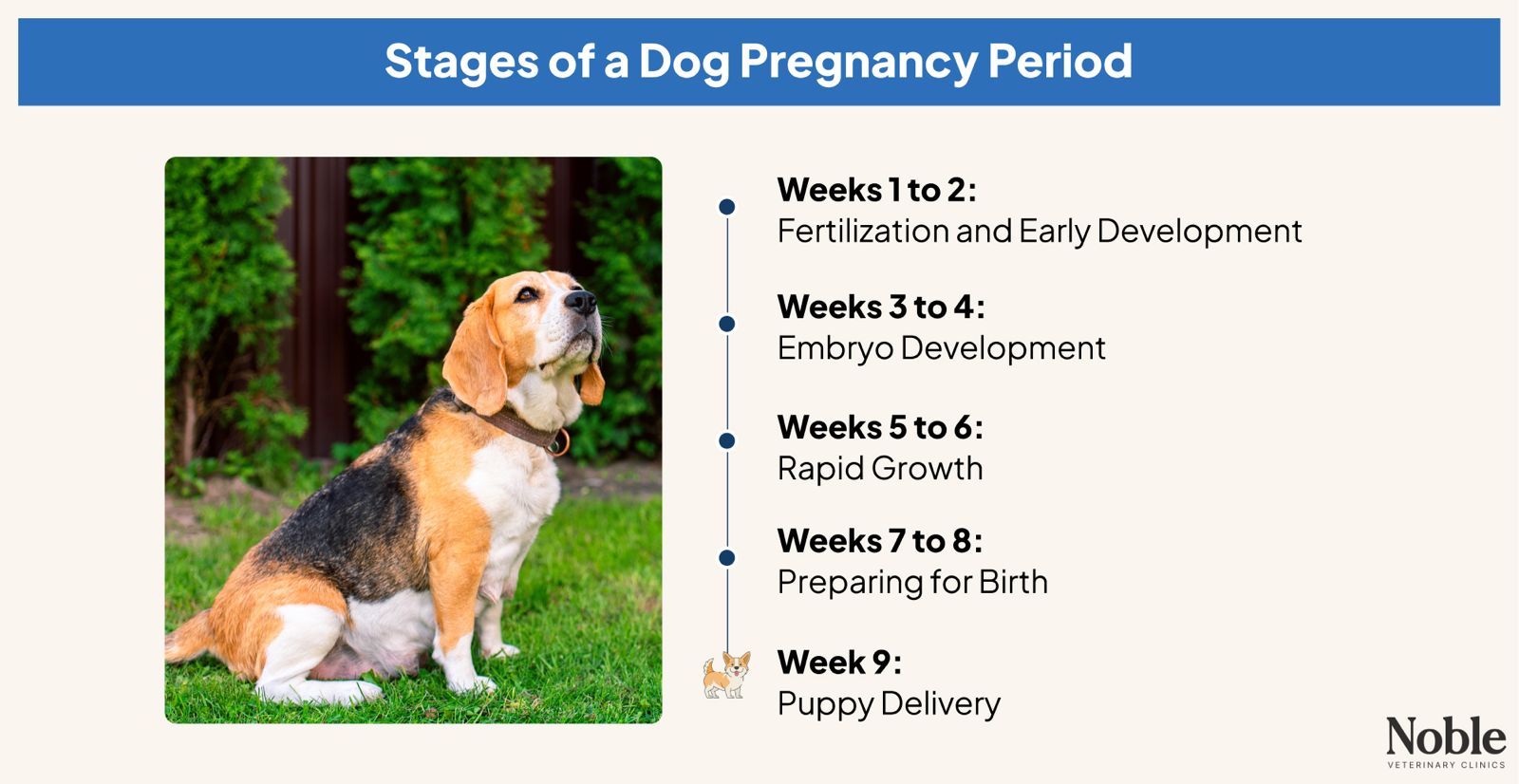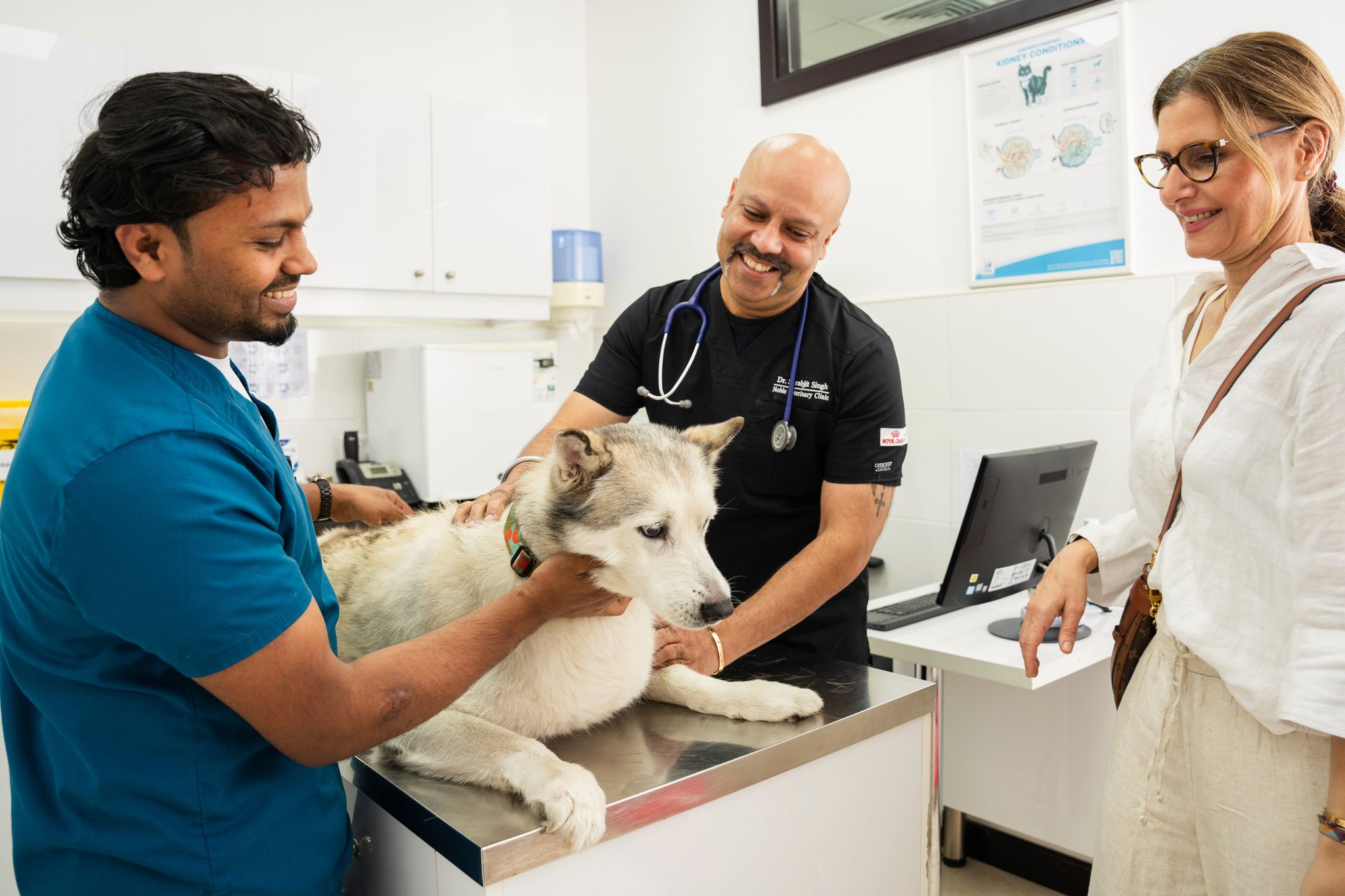


A dog's pregnancy is a wonderful and rewarding experience. However, it’s also a time that requires preparation, care, and understanding. Every stage of a dog’s pregnancy, from its conception to delivery, will need your cooperation and participation.
Unlike humans, dogs have a somewhat short gestation period. This means changes happen quickly, and being attentive to your dog’s behavior and physical condition is crucial. From the first signs of pregnancy, it is important to adjust her diet.
With our help, you can help your dog as she nurtures her pups.
How Long Is a Dog’s Pregnancy Period?
A dog’s pregnancy period, or their gestation period, usually lasts for about 57 to 72 days. The average period is usually 63 days and is the same for all dog breeds and sizes.
What Are the Stages of a Dog's Pregnancy Period?

Weeks 1 to 2: Fertilization and Early Development
After mating, sperm fertilize the eggs in the oviducts. The fertilized eggs, now called zygotes, begin dividing and forming embryos. Around days 7 to 14, these embryos make their way into the uterus and implant onto the uterine lining. This is where they’ll grow throughout the pregnancy.
During this stage, your dog may show little to no visible changes. Some dogs might lose their appetite and feel less energetic. Additionally, your dog’s coat will be plush. She’ll also start to feel the need to sleep more often.
It’s important to keep your dog in a regular exercise routine. Light to moderate activities such as daily walks around the city, playtime, and gentle runs are beneficial. Also, remember to let your dog eat healthy food, drink plenty of water, and rest properly. Make sure to do this while avoiding stress.
Weeks 3 to 4: Embryo Development
By the third week, the embryos will start to develop vital organs and bodily structures. This period in a dog’s pregnancy is critical for development. This is because the risk of miscarriage is higher during early pregnancy.
Hormonal changes may cause mild morning sickness, and you might notice a slight increase in appetite or a need for extra rest. Your dog’s nipples may also start to enlarge slightly. It’s a good time to consult our vets to confirm pregnancy. Ultrasounds will be the key to detecting developing puppies.
When it comes to exercise, short walks are helpful. You’ll need to reduce this amount from the initial weeks to compensate for your dog’s growing belly. However, don’t overdo your dog’s exercise.
Weeks 5 to 6: Rapid Growth
Weeks 5 and 6 will mark a significant growth for your dog’s puppies. Their organs develop rapidly, and they start to resemble tiny puppies. By the end of week 6, the fetuses will have distinct features like toes, claws, and whisker buds.
Your dog’s abdomen will start to enlarge noticeably, and her appetite will increase significantly. Morning sickness and chronic vomiting might also be occasional events. You may also notice some form of behavioral changes in your dog, leaning toward a much calmer demeanor.
White discharge can also be observed. But if this discharge is bloody or discolored, bring your dog to the clinic immediately.
During this stage, be sure to limit your dog’s walks and reduce them by a lot compared to the previous weeks. Your dog’s pregnancy period is fast approaching, which means it’s time to focus on providing enough rest and comfort.
Next, focus on your dog's diet. Change her diet to high-quality puppy food at this stage. This can help your dog get the extra calories and nutrients needed to support her growing puppies. Offering smaller, more frequent meals can help accommodate her increased appetite and limited stomach space.
Weeks 7 to 8: Preparing for Birth
By weeks 7 and 8, the puppies are nearly fully developed and preparing for life outside the womb. Their fur starts to grow, and they become more active, often moving enough for you to feel their kicks. The puppies will have mostly developed by week 7.
Your dog’s belly will be at its largest during week 8, and her nipples may leak milk as her body prepares for nursing. She may become restless and begin nesting, searching for a safe and comfortable place to give birth.
At this stage, reduce her physical activity and ensure she has access to plenty of water and nutritious food. Additionally, our vets recommend using more imaging techniques to detect the number of puppies inside your dog’s belly. By doing so, you’ll be able to prepare for delivery and know how many puppies to expect.
A whelping area is somewhere dogs prepare to give birth to their puppies. Make sure you help your dog prepare this safe space by cleaning the space and adding soft bedding. This allows her to be comfortable before, during, and after the delivery.
Week 9: Puppy Delivery
By the final week, the puppies are fully developed and ready to be born. This is the stage where your dog will stay in the whelping area and give birth to her cute and adorable offspring.
Your dog will show clear signs of impending labor. These signs include a drop in appetite, nesting behavior, and a decrease in body temperature about 12 to 24 hours before labor begins.
She may appear restless, pant excessively, or pace as contractions start, signaling that the puppies are on their way. Keep our vet’s contact information handy in case of complications. Monitor her closely, but give her space to feel comfortable and secure as labor progresses.
When it comes to the delivery process, it’s best not to interfere with or touch your dog. Mother dogs are natural when it comes to the delivery process. If you worry about your dog’s health, you can contact our vets for some assistance. The best thing you can do is monitor your dog’s condition and have a fresh, clean bowl of water nearby.
Nutritional Needs During a Dog Pregnancy

Your dog will need a healthy diet as she progresses in her pregnancy. A mother dog will need all the nutrients she needs to support her pups.
Here’s what you can do to provide your pregnant dog’s nutritional needs:
High-Quality Puppy Food
Your dog’s diet is important for the entire dog pregnancy period. Starting from the fourth or fifth week of pregnancy, we recommend switching to a high-quality puppy food. This type of food gives your dog more nutrients and calories to support the growth of her offspring. Additionally, look for those types that are easily digestible.
High-quality puppy food also helps nourish your dog without having to take in an excessive amount of food. This avoids complications from gaining excessive weight.
Portion Sizes
During the first few weeks of pregnancy, your dog’s calorie needs won’t change much, so you can continue feeding her usual portions. By the second half of her pregnancy, her caloric requirements will increase significantly. If you’re unsure of portions, be sure to ask our vets, and we’ll provide a meal plan.
But in short, you should gradually increase the amount of food for your dog. During the time around the fifth week, we recommend increasing the portion of your dog’s food by 10%. Make sure your dog eats her meals completely so there’ll be no complications during the dog pregnancy period. Gradually increase her portions as the weeks go by.
During the whole feeding process, it’ll be helpful to be with your dog as she eats. If she has trouble eating, make sure you help her eat as she needs these nutrients to make sure her puppies grow healthily.
Hydration Levels
Pregnant dogs may require more water to stay hydrated. Ensure fresh, clean water is always available, especially as her body works harder to support the growing litter. Additionally, you should make sure the dog’s water bowls are regularly cleaned to avoid any diseases.
Weight Gain
Weight gain is completely normal during a dog’s pregnancy period. This is because of the increased needs of the mother dog. However, excessive weight can be dangerous. This can lead to complications during delivery.
Monitor your dog’s body condition regularly. Work with our vets to adjust her diet as needed to maintain a healthy weight.
"Helping a mother dog bring her pups into the world is a journey of trust, care, and love."
- Dr. Leticia Maia
Final Thoughts
Every stage of a dog’s pregnancy period is an important part of the entire process. Each step allows your dog’s offspring to become strong and healthy puppies, which is why it’s important to be there for your best friend.
By providing proper nutrition, creating a safe environment, and staying attentive to your dog’s needs, you can help make her pregnancy a smooth and joyful experience.
Frequently Asked Questions
Share











